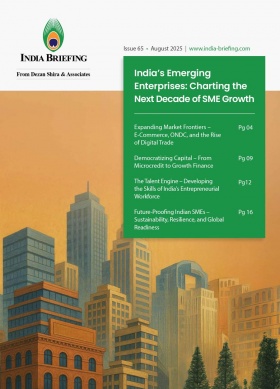Invest in South India: Unlocking Opportunities for Multinational Firms
South India has emerged as one of India’s most dynamic investment regions, attracting multinational corporations (MNCs) and global investors with its skilled workforce, strong infrastructure, pro-business governance, and diversified economy. From high-tech innovation clusters to consumer-driven retail growth and real estate modernization, the region offers a rich mix of opportunities across multiple sectors.
By investing in South India, multinational firms can access a rapidly expanding consumer base, integrate into sophisticated industrial ecosystems, and leverage policy-backed incentives that facilitate sustainable and profitable business expansion.
Regional overview
South India, comprising Karnataka, Andhra Pradesh, Telangana, Tamil Nadu, and Kerala, is often described as the “engine room” of India’s economic growth. Together, these five states contribute over 31 percent of India’s GDP and are home to some of the country’s most advanced cities, such as Bengaluru, Hyderabad, and Chennai, which rank among Asia’s top investment destinations.
Diverse economic strengths:
- Karnataka leads in technology, R&D, aerospace, and renewable energy.
- Tamil Nadu dominates automotive, electronics, and textile manufacturing.
- Telangana has rapidly evolved into a hub for pharmaceuticals, IT, and biotechnology.
- Andhra Pradesh offers strategic port access and large-scale infrastructure for manufacturing.
- Kerala stands out for its service sector, high literacy rates, and growing logistics and tourism industries.
South India’s economy is powered by well-developed agriculture, advanced manufacturing bases, and a fast-growing services sector. It attracts global players in both mature industries – such as automotive, textiles, and electronics – and sunrise sectors like artificial intelligence (AI), electric mobility, green energy, aerospace, biotechnology, and advanced materials.
In terms of the local business ecosystem, South Indian firms are considered to be conservative. These businesses view their operations as long-term ventures, rather than short-term opportunities to be exploited. They tend to avoid excessive borrowing and are committed to following the law.
Additionally, these companies typically keep a low profile. Such businesses are known for their consistent growth, performance, and dividends, which results in greater earnings predictability. There are always exceptions, and foreign companies seeking local enterprises for business matchmaking or to enter into local sourcing contracts are advised to conduct their due diligence.
Also Read: Karnataka Global Investor Meet 2025: Key Investments Announced, Industrial Policy 2025-30 Unveiled
Strategic infrastructure advantage
A major factor behind South India’s investment appeal is its world-class logistics and infrastructure. The region’s coastal states have multiple deep-sea ports, such as Chennai, Ennore, Krishnapatnam, Kochi, and Mangalore, providing direct maritime access to Southeast Asia, the Middle East, and Africa.
Complementing the ports are international airports in Bengaluru, Chennai, Hyderabad, Kochi, and Thiruvananthapuram, connecting the region to major global hubs. The Golden Quadrilateral highway network and Dedicated Freight Corridors (DFCs) enhance trade connectivity with northern and western India.
|
Infrastructure Fact Sheet: South India |
|
|
Infrastructure type |
Highlights |
|
Ports |
15 major and minor ports across Tamil Nadu, Andhra Pradesh, Kerala, and Karnataka |
|
Airports |
9 international airports; Chennai, Bengaluru, and Hyderabad among India’s busiest |
|
Industrial parks / SEZs |
Over 100 active parks, led by SIPCOT (Tamil Nadu), APIIC (Andhra Pradesh), and TSIIC (Telangana) |
|
Metro connectivity |
Operational in Bengaluru, Chennai, Hyderabad, and Kochi, improving urban mobility |
|
Power and renewables |
Leading renewable energy capacity—Tamil Nadu and Karnataka rank top 3 nationally in wind and solar |
These infrastructure strengths are critical for export-oriented manufacturing and e-commerce fulfillment, enabling firms to reduce logistics costs and ensure just-in-time delivery to domestic and international markets.
Consumer spending and retail growth trends
South India’s urbanization rate exceeds 45 percent, making it one of India’s most urbanized regions. Rising incomes, a young population, and expanding middle-class consumption are fueling a boom in retail trade and consumer services.
- The retail market size in South India is projected to surpass US$300 billion by 2030, led by Tier-1 cities like Chennai, Bengaluru, and Hyderabad.
- E-commerce adoption is accelerating, with online penetration above 70 percent in urban centers.
- Luxury and lifestyle retail are expanding in Tier-1 cities, while Tier-2 cities like Coimbatore, Mysuru, and Vizag are witnessing a surge in organized retail demand.
Foreign investors are increasingly entering India’s multi-brand retail, food and beverage, and consumer electronics markets through joint ventures and franchising models. Government initiatives such as the National Retail Policy (draft) and 100 percent FDI allowance in single-brand retail provide further incentives.
These trends signal significant potential for global brands in fashion, electronics, and home furnishings to expand in South India’s high-spending metropolitan markets.
Real estate and commercial infrastructure
1. Office real estate
South India is the largest office space market in India, accounting for nearly 40 percent of total absorption. Bengaluru and Hyderabad consistently top the list of preferred locations for IT/ITES, R&D, and fintech firms. Grade-A commercial developments offer competitive rental yields compared to Delhi or Mumbai, alongside abundant talent pools and superior urban infrastructure.
Key office clusters:
- Bengaluru: Outer Ring Road, Whitefield, Electronic City
- Hyderabad: HITEC City, Gachibowli, Nanakramguda
- Chennai: OMR (Old Mahabalipuram Road), Guindy, Taramani
2. Residential real estate
With a large base of skilled professionals and increasing expatriate presence, residential demand in Chennai, Hyderabad, and Bengaluru remains strong. Developers are prioritizing integrated townships and co-living models, targeting the millennial and international workforce segments.
3. Industrial real estate
South India’s industrial corridors, such as the Chennai-Bengaluru Industrial Corridor (CBIC) and the Visakhapatnam-Chennai Industrial Corridor (VCIC), offer vast land availability, power stability, and policy-linked incentives for manufacturing units and logistics parks. Warehousing and industrial leasing are on the rise as e-commerce, EV production, and electronics manufacturing expand.
Emerging hotspots:
- Sri City (Andhra Pradesh): Integrated business city hosting MNCs like Pepsico, Isuzu, and Kobelco.
- Oragadam (Tamil Nadu): Automotive and electronics hub.
- Tumakuru (Karnataka): Part of the National Industrial Corridor with advanced logistics connectivity.
Economic performance: South India’s growth engine
According to the country’s Chief Economic Advisor, Dr. V. Anantha Nageswaran, the southern region recorded an impressive GDP growth rate of 6.3 percent in FY 2024-25, outpacing India’s national average of 5 percent. The combined contribution of the five south Indian states accounts for nearly one-third of India’s total GDP.
Economic output and top sectors: India’s southern states
|
Key Highlights: Economies of India’s Southern States |
|||
|
State |
FY 2024-25 GSDP (INR trillion) |
FY 2024-25 GSDP (US$ billion) |
Top sectors |
|
Tamil Nadu |
31.55 |
358.79 |
Automotive, Electronics, Textiles, Renewables |
|
Karnataka |
28.09 |
319.44 |
IT, Biotech, Aerospace, Green Energy, Start-Ups |
|
Telangana |
16.50 |
187.64 |
Pharmaceuticals, Data Centers, Electric Vehicles, Start-ups |
|
Andhra Pradesh |
15.89 |
180.70 |
Ports, Food Processing, Heavy Industries |
|
Kerala |
12.40 |
141.01 |
Tourism, IT Parks, Healthcare, Logistics |
(US$1 = INR 87.93)
Per capita income (FY 2025) across South India
- Karnataka: INR 204,605 (US$2,326)
- Kerala: INR 202,000 (US$2,297)
- Tamil Nadu: INR 196,309 (US$2,232)
- Telangana: INR 187,912 (US$2,137)
- Andhra Pradesh: INR 141,609 (US$1,610)
This steady income growth and fiscal discipline make South India one of the most financially stable and attractive regions for long-term FDI.
Major multinational investors in South India
|
Major Multinational Companies Investing in South India |
|
|
State in South India |
Major investors |
|
Andhra Pradesh |
Foxconn, Gamesa, GlaxoSmithKline, ISUZU, Kellogg’s, KG, Mylan, Pepsi, Mondelez International, Godrej, GMR, Hero, Kia, Wipro, MI, Reliance, Walmart, LT, Biocon, Aditya Birla UltraTech, Daikin Industries, Google, Raymond Group, ArcelorMittal, Bharat Forge, BPCL |
|
Karnataka |
Cisco, Oracle, DreamWorks Studio, Saint-Gobain, Delphi, EA Sports, GE, Intel, Novozymes, Nvidia, Qualcomm, SONY, Texas Instruments, Rolls Royce, Toyota, Volvo, ABB, Foxconn, JSW Group, Toyota Kirloskar, Hero Future Energies, Exide, Air India, Epsilon Group, TVS Motors, LAM Research, Mahindra Group, Essar Renewables, Suzlon Energy |
|
Kerala |
Xerox, Roots, a.hartrodt, reon technologies, Infosys, rrj communications, Collabera, Nissan, LuLu, Adani Group, Adtech Systems, BPCL, Joy Alukkas, Malabar Group, NRG Corporations, Hi Lite Group, Cherri Holdings, Prestige |
|
Tamil Nadu |
ABB, Accenture, Coca Cola, Daimler, Dell, flex Foxconn, GE, Renault-Nissan, Honeywell, Hyundai, Lotte, Michelin, Nokia, Nestle, Pfizer, ramco aviation, Samsung, Siemens, Wockhardt, Yamaha, Ola Electric, TVS Motors, Ather Energy, Ampere, Asian Development Bank, The World Bank, Indian Bank, TIDCO, TIDEL |
|
Telangana |
Samsung, Microsoft, Facebook, Amazon, Ferring Pharmaceuticals, Lonza, Pratt & Whitney, Oracle, Cisco, Google, Coca Cola, Hyundai, GE, Foxconn, Suzlon, Greenko, ICICI Venture, Shaiva Group, Taranis Capital, Sun Petrochemicals, Tillman Global Holding, Megha Engineers |
These firms represent diverse industries – from advanced manufacturing and software development to renewable energy and consumer goods – highlighting South India’s versatility as an investment ecosystem.
Policy environment and investment incentives
All southern states have implemented investor-friendly industrial policies emphasizing ease of doing business, sector-specific incentives, and fast-track approvals. Initiatives include:
- Single-window clearance systems for business setup.
- Stamp duty exemptions and power subsidies for manufacturing projects.
- Tax rebates and capital subsidies for investments in renewable energy and R&D.
- Special Economic Zones (SEZs) and industrial parks offering world-class infrastructure.
For example, Tamil Nadu’s Guidance Bureau and Telangana’s T-Hub and TS-iPASS have become models of efficient investor facilitation, helping foreign firms navigate local regulations and partnerships.
Outlook: Why Multinationals Should Prioritize South India
As India moves toward becoming a US$5 trillion economy, South India will remain its most globally integrated region – home to the country’s leading tech exports, innovation centers, and export-oriented manufacturing clusters.
Key advantages for foreign investors:
- Access to a large, educated, and English-speaking workforce.
- Proximity to global shipping routes and regional trade partners.
- Competitive industrial real estate and reliable power supply.
- Fast-growing urban consumer markets.
- Supportive government agencies offering sector-tailored incentives.
Contact our India investment advisors at india@dezshira.com to discuss location analysis, incentive negotiation, and entry structuring for South India.
Final takeaway
South India’s combination of economic diversity, infrastructural readiness, and consumer dynamism creates a unique platform for multinational expansion. Whether in manufacturing, technology, retail, or logistics, the region delivers a balance of growth potential and operational stability unmatched by many emerging markets.
Foreign investors exploring new growth nodes in Asia will find South India not just a destination for market entry, but a foundation for long-term regional leadership.
About Us
India Briefing is one of five regional publications under the Asia Briefing brand. It is supported by Dezan Shira & Associates, a pan-Asia, multi-disciplinary professional services firm that assists foreign investors throughout Asia, including through offices in Delhi, Mumbai, and Bengaluru in India. Dezan Shira & Associates also maintains offices or has alliance partners assisting foreign investors in China, Hong Kong SAR, Vietnam, Indonesia, Singapore, Malaysia, Mongolia, Dubai (UAE), Japan, South Korea, Nepal, The Philippines, Sri Lanka, Thailand, Italy, Germany, Bangladesh, Australia, United States, and United Kingdom and Ireland.
For a complimentary subscription to India Briefing’s content products, please click here. For support with establishing a business in India or for assistance in analyzing and entering markets, please contact the firm at india@dezshira.com or visit our website at www.dezshira.com.
Also read
- Tamil Nadu’s Industrial Parks and SEZs under SIPCOT: A Brief for Investors
- Apple’s Contract Manufacturers and Component Suppliers in India
- Karnataka Notifies Peenya as Special Investment Region to Boost Industrial Growth
- Previous Article RBI Extends Export Proceeds Repatriation Timeline for IFSC Accounts
- Next Article Depreciation Rules and Asset Management under Indian GAAP: An Explainer












